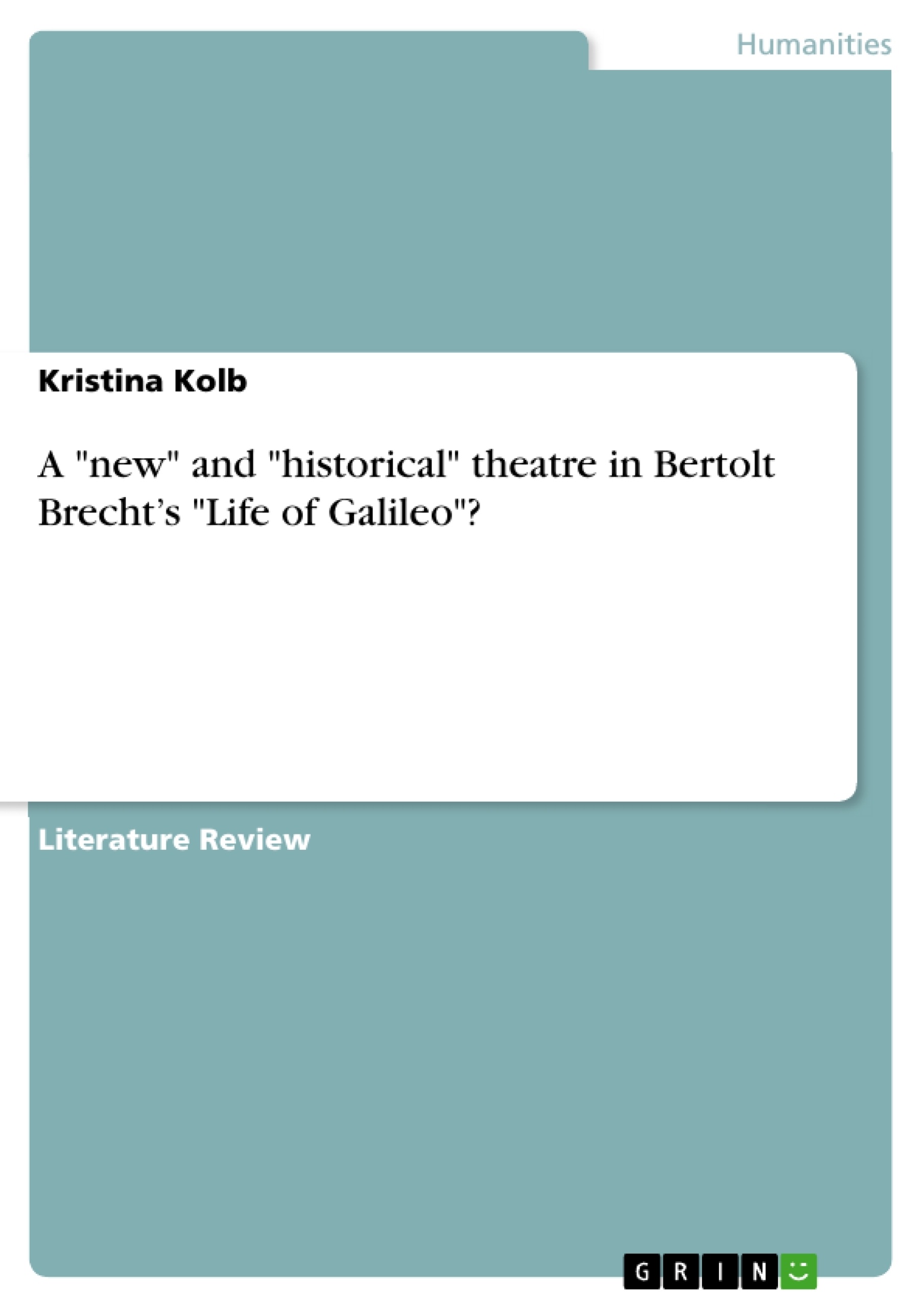Just like Brecht’s ideas about theatre changed throughout his career as a dramaturg and a playwright, most prominently embodied in the three different versions of Life of Galileo, moving away from the formalist epic theatre towards a dialectical one, so have our perceptions of the theatre, and what was new and revolutionary during the early years of the play’s production has now been reappropriated by high culture. While Brecht displayed a great awareness of the need to continuously adapt his play in order to not only make it appropriate for the times, but also to maintain it appropriate in the light of changing times, different productions of the play have only done so with limited courage and success, leading to the sad result that what Life of Galileo once embodied is usually not entirely what it embodies now.
Table of Contents
- A “new” and “historical” theatre in Bertolt Brecht's Life of Galileo?
- Brecht's “new” and “historical” theatre was in opn opposition to the European tradition of theatre
- As critics and playwrights claim alike, Brecht revolutionarized the theatre.
- Brecht himself wrote three distinct versions of Life of Galileo and different translations and interpretations of the play make it impossible to treat it like a single entity.
- As Brecht elaborated in his Short Organum for the Theatre, the main aim of his "new theatre" was to provoke the audience to think about the status quo, question what is commonly accepted to be the “Truth”, and to show both as alterable.
- In order to fully achieve his aims and involve the spectator's in the aforementioned process, however, Brecht thought it necessary to alienate the audience and present his argument in a dialectic manner in order to show individuals conditioned by time and class, and display "truth" as temporary and society as alterable.
- However, in order to activate reason and the critical faculties that are necessary for an analysis of the issues presented to the audience, the spectator is not allowed to fall into a state of “trance”, but, instead, needs to be aware of the fact that he/she is watching a representation of reality.
- Even though the term “epic theatre” is mainly associated with Brecht, it also was not new, being already practised in Berlin in the 1920s by Erwin Piscator, who included films and slides in the plays he directd and produced.
- Depite the fact that Brecht's main aims are realized well in the play, some of the techniques used, especially in Losey's film version, contradict Brecht's original ideas about the theatre.
Objectives and Key Themes
This text explores the innovative theatrical practices of Bertolt Brecht, focusing on his play "Life of Galileo" as a prime example of his "new" and "historical" theatre. The text examines how Brecht aimed to revolutionize theatre, moving away from traditional Aristotelian forms to create a form of theatre for the masses that would engage reason and critique the status quo.
- Brecht's critique of traditional theatre and its limitations in representing social reality
- The development of Brecht's "new" and "historical" theatre, with a focus on alienation effects and dialectical presentation
- The role of history in Brecht's theatrical practice and its contribution to critical thinking
- The interplay between Brecht's theoretical concepts and their embodiment in "Life of Galileo"
- The analysis of different interpretations of the play, including Brecht's own versions and adaptations
Chapter Summaries
The text begins by introducing Brecht's "new" and "historical" theatre, contrasting it with the traditional Aristotelian form. It highlights how Brecht's ideas evolved over time and were reflected in the different versions of "Life of Galileo".
The text then delves into the historical context of Brecht's work, emphasizing his dissatisfaction with the traditional theatre in light of the changing world, marked by the rise of fascism and technological advancements. It discusses Brecht's involvement with Marxism and his belief in the potential for a new society, which influenced his theatrical aims.
The text further explores Brecht's concept of "open" drama, contrasting it with the "closed" form of Aristotelian tragedy. It elaborates on Brecht's use of alienation effects to encourage critical engagement from the audience and his desire to create a theatre that would be both entertaining and educational.
The text continues by analyzing specific scenes from "Life of Galileo", illustrating how Brecht's ideas are put into practice. It highlights the importance of the historical setting, the use of dialectical presentations, and the deliberate alienation of the audience as key elements in achieving Brecht's theatrical objectives.
Keywords
The text focuses on the concept of Brecht's "new" and "historical" theatre, exploring its characteristics and aims. Key terms include: Aristotelian theatre, alienation effects, dialectical presentation, epic theatre, "Life of Galileo", historical setting, social reality, critical engagement, and the "children of the scientific age".
- Quote paper
- Kristina Kolb (Author), 2007, A "new" and "historical" theatre in Bertolt Brecht’s "Life of Galileo"?, Munich, GRIN Verlag, https://www.grin.com/document/138850




